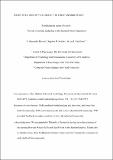Files in this item
Rethinking the nature of cruelty : the role of identity leadership in the Stanford Prison Experiment
Item metadata
| dc.contributor.author | Haslam, Alexander S. | |
| dc.contributor.author | Reicher, Stephen D. | |
| dc.contributor.author | Van Bavel, Jay J. | |
| dc.date.accessioned | 2019-09-26T11:30:04Z | |
| dc.date.available | 2019-09-26T11:30:04Z | |
| dc.date.issued | 2019-10-01 | |
| dc.identifier | 261371651 | |
| dc.identifier | e6e21e7c-c426-4fb2-ac21-8d1a7eab959e | |
| dc.identifier | 85068459573 | |
| dc.identifier | 000488834600005 | |
| dc.identifier.citation | Haslam , A S , Reicher , S D & Van Bavel , J J 2019 , ' Rethinking the nature of cruelty : the role of identity leadership in the Stanford Prison Experiment ' , American Psychologist , vol. 74 , no. 7 , pp. 809-822 . https://doi.org/10.1037/amp0000443 | en |
| dc.identifier.issn | 0003-066X | |
| dc.identifier.other | crossref: 10.1037/amp0000443 | |
| dc.identifier.uri | https://hdl.handle.net/10023/18565 | |
| dc.description.abstract | The Stanford Prison Experiment (SPE) is one of the most famous studies in the history of psychology. For nearly a half century it has been understood to show that assigning people to a toxic role will, on its own, unlock the human capacity to treat others with cruelty. In contrast, principles of identity leadership argue that roles are unlikely to elicit cruelty unless leaders encourage potential perpetrators to identify with what is presented as a noble ingroup cause and to believe their actions are necessary for the advancement of that cause. Although identity leadership has been implicated in behavior ranging from electoral success to obedience to authority, researchers have hitherto had limited capacity to establish whether role conformity or identity leadership provides a better account of the cruelty observed in the SPE. Through examination of material in the SPE archive, we present comprehensive evidence that, rather than guards conforming to role of their own accord, experimenters directly encouraged them to adopt roles and act tough in a manner consistent with tenets of identity leadership. Implications for the analysis of conformity and cruelty as well as for interpretation of the SPE are discussed. | |
| dc.format.extent | 335207 | |
| dc.language.iso | eng | |
| dc.relation.ispartof | American Psychologist | en |
| dc.subject | Leadership | en |
| dc.subject | Followership | en |
| dc.subject | Social identitfication | en |
| dc.subject | Identity entrepreneurship | en |
| dc.subject | Standford Prison Experiment | en |
| dc.subject | BF Psychology | en |
| dc.subject | DAS | en |
| dc.subject | BDC | en |
| dc.subject | R2C | en |
| dc.subject.lcc | BF | en |
| dc.title | Rethinking the nature of cruelty : the role of identity leadership in the Stanford Prison Experiment | en |
| dc.type | Journal article | en |
| dc.contributor.institution | University of St Andrews. School of Psychology and Neuroscience | en |
| dc.contributor.institution | University of St Andrews. Centre for Research into Equality, Diversity & Inclusion | en |
| dc.contributor.institution | University of St Andrews. St Andrews Sustainability Institute | en |
| dc.identifier.doi | 10.1037/amp0000443 | |
| dc.description.status | Peer reviewed | en |
| dc.identifier.url | https://doi.org/10.1037/amp0000443.supp | en |
| dc.identifier.url | https://doi.org/10.31234/osf.io/b7crx | en |
This item appears in the following Collection(s)
Items in the St Andrews Research Repository are protected by copyright, with all rights reserved, unless otherwise indicated.

